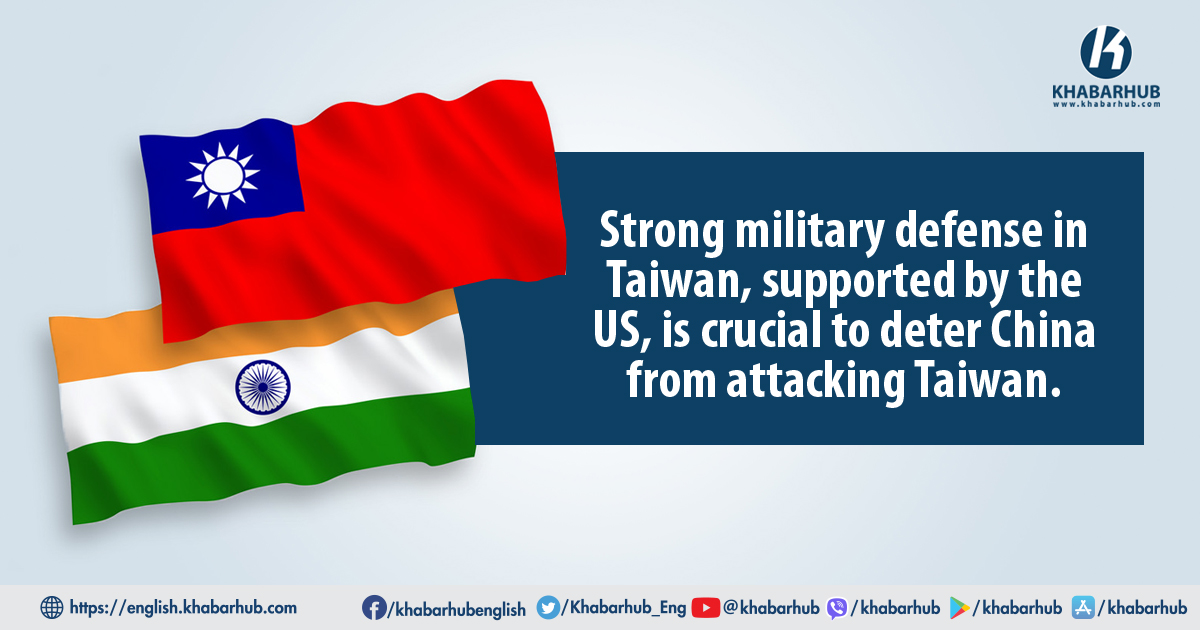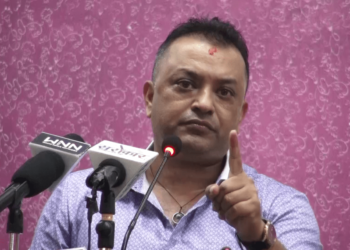An Australian think tank, the Australian Strategic Policy Institute, has released a report highlighting India’s potential to play a key role in deterring China from using force to unify Taiwan.
The report argues that India’s influence goes beyond military strength.
Instead, it focuses on India’s economic clout, diplomatic ties, legal options, and strategic importance.
It proposes six alternative methods for India to leverage these strengths to discourage China from using military force and influence its decision-making regarding Taiwan.
China indicated a stricter stance towards Taiwan in early March. Taiwan is an island nation that governs itself, but China claims it as part of its territory.
During a meeting of China’s legislature, the National People’s Congress, on March 5th, officials dropped previous references to peacefully reunifying Taiwan with the mainland.
The new language emphasizes “firm” reunification, suggesting a more forceful approach.
Finally, countries can remind China that wars can have unintended consequences. Russia’s invasion of Ukraine led to Finland and Sweden joining NATO, hurting Russia’s goals.
The paper by the Australian Strategic Policy Institute (ASPI) raises concerns that if China were to take control of Taiwan, it would significantly alter the balance of power in Asia, particularly for India.
It suggests that a Chinese victory would likely embolden Beijing to pursue other territorial claims, including the disputed state of Arunachal Pradesh in India.
This is not a new issue, as China has a history of making claims on Arunachal Pradesh, which have always been firmly rejected by the Indian government.
While China prioritizes gaining control of Taiwan, possibly through force, and is building a strong military for that purpose, other countries’ responses are unclear.
Despite the tense situation, China can be deterred from attacking.
While they are determined to take control and are preparing various military options, a full-scale invasion is a last resort.
China would prefer non-military unification to avoid economic devastation and global risks.
They will likely wait until they believe they have a high chance of success before attacking. International cooperation during peacetime can influence China’s decision by making them doubt their success in an attack.
To prevent a conflict over Taiwan, more countries need to get involved using a wider range of tools.
Any country that wants to avoid war can help by taking various actions, not just building up Taiwan’s military.
Countries that don’t want to fight directly can still help by using political tools, diplomacy, economic pressure, or even some military actions outside of Taiwan.
The report takes up India as an example of a country that does not want to be involved in a military confrontation but still has an interest in preventing war, arguing that India could be a leader in getting other countries to help deter China.
There are six main ways countries could help: using international law, creating arguments against aggression, working together on diplomatic messages, strengthening economies to be more resistant to pressure, using information to support Taiwan’s people, and giving military aid to the US outside of Taiwan.
China’s military and economic strength is significant, and it currently has the upper hand militarily around Taiwan.
To effectively deter China, more countries need to use non-military tools to exert pressure.
This pressure needs to be applied not just near Taiwan, but also on a global scale.
These countries can convince China that the conditions aren’t right for an attack.
China would likely only use military force after setting the stage through legal and political means, reducing international intervention, and weakening Taiwan’s will to resist.
By targeting these aspects of China’s strategy, non-military countries can make China think twice and delay any potential attack.
While deterring China won’t guarantee Taiwan’s victory in the way military action could, it can make China less confident of success and convince them to hold off on attacking.
Additionally, involvement from more countries would show China that opposition goes beyond just Taiwan and the US, potentially undermining China’s broader goals.
India is a good example of a country that can use various non-military tools.
As its competition with China has grown, so has its willingness to counter China’s influence.
India has a border dispute with China and a strong interest in maintaining stability in the region.
It has shown this by deepening its relationship with Taiwan, despite China’s disapproval.
India’s actions to deter China are also in its own best interest.
They help India gain power and influence relative to China, strengthen its relationship with the US, and boost its global standing.
Furthermore, India’s growing power and independent foreign policy make it a potential leader among non-military countries in deterring Chinese aggression.
India has a chance to influence China’s decision-making on Taiwan through various peaceful actions.
These are just some ideas, and other countries can adapt them based on their situations.
One approach is to argue for Taiwan’s rights using international law.
Countries haven’t done this much so far, and China has gotten away with taking territory in the South China Sea.
But legal arguments can be effective, as shown in a recent ruling against China.
India has already shown success in building consensus around principles like “this is not an era of war” within large groups like the G20.
In Taiwan’s case, countries could emphasize that using force is illegal, regardless of whether Taiwan is considered a separate country.
Another strategy is to shape public opinion. China claims Taiwan is a domestic issue, but other countries can counter that narrative.
They can stress that using force anywhere in the region is wrong and harms everyone economically.
India has already begun to speak out against China’s actions.
Emphasizing the practical consequences of war, like disruptions to trade, would be particularly persuasive.
Finally, countries can remind China that wars can have unintended consequences. Russia’s invasion of Ukraine led to Finland and Sweden joining NATO, hurting Russia’s goals.
An invasion of Taiwan could similarly backfire on China, pushing India and other countries closer to the US.
By repeatedly highlighting the legal and economic downsides of conflict, India and others can create a strong counter-narrative to China’s claims on Taiwan.
Strong international narratives against an attack on Taiwan are important, but to truly deter China, these narratives need to be backed by clear diplomatic messaging.
Countries like India, with their established diplomatic networks, can play a key role. India holds significant diplomatic weight, especially with countries that might be wary of the US.
Indian messages would resonate strongly in Southeast Asia and other parts of the global South because India is seen as an independent voice, not simply parroting US interests.
The core message – that military action against Taiwan is unacceptable and would have severe consequences – should stay consistent, but the way it’s delivered can be tailored to specific audiences and diplomatic channels.
Against this context, India’s most effective role would be to support US forces in the Indian Ocean, making China fight on multiple fronts and raising the risk of the conflict escalating beyond Taiwan.
India has already shown success in building consensus around principles like “this is not an era of war” within large groups like the G20.
Smaller, results-oriented groups like the Quad have also made veiled references to Taiwan, and similar tactics could be used in future statements.
A potential conflict over Taiwan would likely involve economic warfare alongside military action.
Studies show China uses economic pressure more often in Taiwan-related disputes than anything else.
This means they would likely target countries that take actions to help Taiwan, even if those actions aren’t military.
Therefore, countries that don’t want to be involved in a military conflict should take steps to weaken China’s ability to pressure them economically.
India, for instance, trades less with China overall, but relies heavily on China for certain supplies needed for important industries.
By reducing this dependence, India would be less vulnerable to Chinese retaliation and freer to deter conflict.
In conclusion, China aims to weaken Taiwan’s will to resist through disinformation.
To counter this, non-belligerent countries can help by exposing China’s lies.
While directly disrupting China’s networks with cyberattacks is an option, careful consideration is needed to ensure legality.
They are most effective if implemented before a crisis, and while they may have some drawbacks, they are generally less expensive than military expansion.
Militarily, these countries can deter China by making an attack on Taiwan a wider conflict.
This doesn’t require direct fighting, but actions like offering logistical support or allowing access to bases in Southeast Asia.
By raising the stakes and making the war more complex, China might be dissuaded from attacking in the first place.
Against this context, India’s most effective role would be to support US forces in the Indian Ocean, making China fight on multiple fronts and raising the risk of the conflict escalating beyond Taiwan.
This would ultimately make China think twice about invading.
Strong military defense in Taiwan, supported by the US, are crucial to deter China from attacking Taiwan.
However, the situation is complex and requires a combined effort from many countries.
China’s decision to invade will be based on various factors, not just military strength.
To influence this decision, various non-military options may be useful. These options are meant to give countries more flexibility to deter war without directly getting involved in a fight.
They are most effective if implemented before a crisis, and while they may have some drawbacks, they are generally less expensive than military expansion.
India will do well to examine some of these policy prescriptions for potential interventions.









Comment